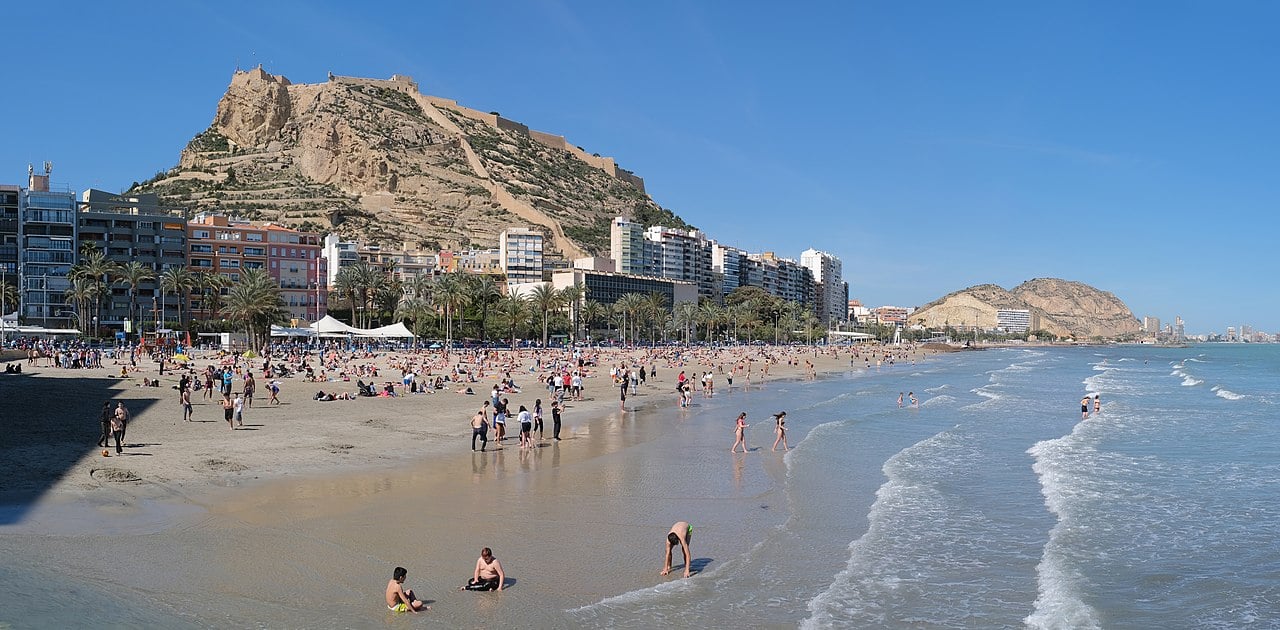Both Valencia and Alicante are in the southeastern Spanish region known as the Valencian Community.
The Valencian Community has three provinces: Valencia, Alicante, and Castellón.
Within those three provinces, each has a capital. As you might’ve guessed, Valencia city is the capital of the Valencia province, and Alicante is the capital of Alicante province. Valencia is also the capital of the entire region.
Often when foreigners refer to Alicante they are referring to the wider province and not the capital city itself. The province has long been a popular tourist destination, with places like Torrevieja and Benidorm well known among foreigners.
Alicante city itself is not specifically a holiday resort, but rather a normal Spanish city, though in the summer months there is some spill over from the surrounding tourist hotspots.
Population
In terms of population, Valencia city is more than twice as big as Alicante. Valencia has almost 800,000 inhabitants according to Spain’s national statistics body INE, making it Spain’s third largest city after Madrid and Barcelona.
The wider Valencia urban area has a population of around 1.6 million people. Many locals say one of the best things about Valencia is that it feels like a big city, and has all the big city amenities you need, but without feeling too big and overbearing like Madrid or Barcelona.
The population of Alicante is 337,304, which makes it the second largest city in the region after Valencia.
Alicante may see a spike in population due to tourism in the summer months, but it still feels like somewhat of a big town as opposed to a city where you’ll see the same faces around town.
In terms of how Spanish each city is, Alicante province has the third highest number of foreigners after Madrid and Barcelona with 388,750 (including 76,000 Britons) and Alicante city has almost 50,000 residents from overseas. However, as mentioned earlier, Alicante city doesn’t feel as if it has as many foreigners as other towns and villages in the province.
In Valencia city, 83.5 percent of the population is Spanish, but it’s still a fairly cosmopolitan city with a smaller proportion of Brits and plenty of Colombians, Italians and other nationalities.
READ ALSO:
Property and cost of living
In Valencia, the average cost to rent is €12/m2 as of July 2023, a whopping 21.5 percent increase on July 2022, according to Idealista. To buy property, the average is €2,247/m2.
Alicante is generally a little cheaper for both buying and renting. As of July 2023, the average price to rent was €10.2/m2, 21.8 percent more than a year ago, and €1,796/m2 to buy.

In terms of cost of living, Alicante is on average 11 percent cheaper than Valencia when factoring in other daily costs such as food, leisure, transport and clothing.
This reflects how Valencia is a relatively well priced city considering it’s Spain’s third most populous, even though living costs across the country have risen over the past two years due to inflation.
READ MORE:
- The cheapest and most expensive areas to buy or rent in Valencia
-
How much does it really cost to live in Spain’s Valencia?
- A quick guide to the best neighbourhoods in Alicante
Proximity and connectivity
Both cities are pretty evenly matched when it comes to connectivity.
Alicante is just 12.2km from the nearest airport, Alicante-Elche, which is a 20 minute drive or taxi and takes around 30 minutes on the shuttle bus service.
Alicante also has a bus station that has national ALSA services that go across the country, and a train station with direct high-speed AVE connections to Madrid in around 2.5 hours.
Alicante is 167km from Valencia (around a 2 hour drive north) and just 82.6km from Murcia (a roughly 1 hr 10 minute drive southward).
Valencia is equally close to its nearest airport, with the city centre just 10.6km away.
Barcelona is 350km away and can be reached with a 3hr train or roughly 3.5 hr drive northward up the coast.
Madrid is slightly further, 361km away, which is also roughly a 3.5hr drive, but does have a direct 2hr AVE train connection to the capital.
READ ALSO: The most picturesque day trips in Spain’s Alicante province
Beaches and nature
If you take a look at a map, you’d be forgiven for thinking that both cities have beaches right in the centre. This isn’t the case. Alicante is right on the beach, with Postiguet beach just a couple of minutes walk from the city centre.
Valencia city centre, on the other hand, is not right on the coast. There is one barrio (neighbourhood) on the coast, the old fisherman’s quarter, El Cabanyal, but the city centre is a roughly half hour bus away from the beach.
Both the main beaches in Valencia (La Malvarrosa) and Alicante (Postiguet) are quite touristy, and can be completely full during the summer season.
Fortunately, both cities are well supplied with quieter beaches just short drives or bus journeys away, notably San Juan in Alicante and El Saler in Valencia.
In terms of nearby nature, it’s also pretty close between the two cities. Alicante has 9 national parks in the province, whereas Valencia has 8, notably Albufera, just a twenty minute drive from the city and the (supposed) birthplace of paella valenciana.

Cultural attractions and architecture
Being a bigger city, Valencia has more cultural and tourist attractions, notably La Ciudad de las Artes y Ciencias, a whole host of museums and the famous Turia park in the old riverbed than runs through the city.
Alicante isn’t without things to do, however, with the Castillo de Santa Barbara and Museo Arqueológico de Alicante (known as MARQ) both worth a visit.
In terms of architecture, Valencia wins here. In fact, Alicante is known among many Spaniards as being quite ugly due to its endless rows or apartment blocks and hotels.
Valencia, on the other hand, has a 13th century cathedral and the quaint casco antiguo – the old town.
READ ALSO: Seven essential apps that make life in Valencia easier for foreign residents

Conclusion
For foreigners coming to Spain, Valencia and Alicante will probably feel quite similar. Both are Mediterranean cities with beaches nearby, a warm climate, friendly people, and relaxed pace of life.
However, there are differences. Valencia is slightly more expensive, bigger, more cosmopolitan, classy, it has a larger cultural offering and has something of a ‘big city’ bustle feel, though not in an overwhelming sense.
Alicante is more relaxed, it feels like a big town rather than a small city, it has a great party atmosphere and is more of a beach city.
Both are wonderful cities with a lot to offer, it just depends what you’re after.
READ ALSO:



 Please whitelist us to continue reading.
Please whitelist us to continue reading.
Member comments